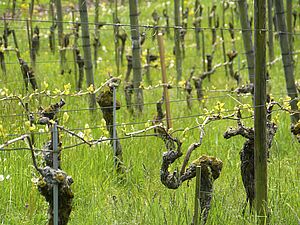
The Viticulture & Oenology group is active in research and advisory roles and works on advancing existing cultivation systems in organic viticulture. The aim is to improve production conditions in order to foster sustainability. The group’s activities and projects are conducted in close cooperation with practitioners as well as with partners and institutions along the entire value chain. In this context there is a further emphasis on exchanges at both the national and international levels with stakeholders working on the same challenges. The dissemination of knowledge generated through various communication channels is key to ensuring that organic and viticulture can be supported optimally.
Work priorities
- Cultivation techniques: Activities regarding cultivation techniques cover topics such as nutrient supply by comparing different cover cropping and management systems in the mid-row and undervine, optimisation of plant protection strategies, climate change adaptation strategies for the vineyard and winery, and approaches to fostering economic efficiency.
- Biodiversity: To increase biodiversity in vineyards, the development and management of seed mixes for sown wildflower strips in the mid-row is being advanced. Another focus is the general enhancement of vineyard landscapes and low-competition, species-rich undervine cover crops.
- PiWi robust grape varieties: New robust grape varieties with resistance traits to fungal diseases (known as PiWi varieties) are tested at several sites with regard to disease resistance and cultivation characteristics, optimisation of crop protection measures, vinification and wine quality. In order to promote the market introduction of PiWi varieties, circumstances that either foster or hamper their introduction among consumers and producers or in the trade are analysed.
- Organic planting stock: Together with grapevine nurseries, the Cultivation Technique Fruit & Wine Crops Group works on promoting the production of organic grafted grapes on the basis of the Bio Suisse Standards and approved auxiliary inputs. The main focus is on optimising production practices in terms of quality, yield and economic efficiency.
- Biodynamic viticulture: In a long-term systems comparison trial at FiBL and on six commercial farms in the German-speaking parts of Switzerland and in Romandie, biodynamic methods of varying intensity and the effect of individual compost preparations on the grapevine's ability to adapt to climate change are compared.
- Advice and extension: Existing and newly generated knowledge is disseminated by means of individual consultations, bulletins, courses, exchanges of experience, technical guides, videos and other channels in order to optimally support practitioners and promote organic viticulture.
Contact
Projects
Team
| Group Viticulture & Oenology | ||
| Hauenstein Linnéa | Research and advisory services viticulture and enology | +41 (0)62 865-1723 |
| Lévite Dominique | Research and advisory services viticulture and enology | +41 (0)62 865-7248 |
| Riemann Michael | Co-leader of the Group Viticulture & Oenologyviticulture research, climate stress and phytopathology, molecular biology and plant physiology | +41 (0)62 510-5334 |
| Steinemann Beatrice | Co-leader of the Group Viticulture & Oenologyresearch and advisory services viticulture and enology | +41 (0)62 865-7203 |



